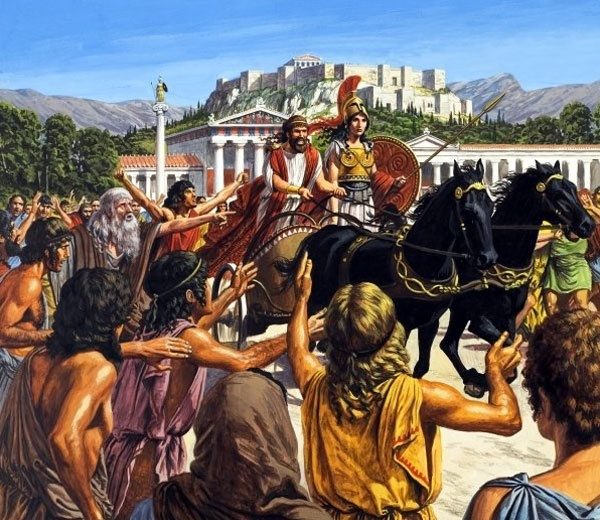Peisistratus (Pisistratus) was tyrant of Athens and led the drive for the unification of Attica, which enabled the city-state to achieve an eminent position in Greek history.
Peisistratus was related to the reformer Solon, whose previous administrative improvements involved ending the monopoly of power exercised by the aristocracy and the implementation of a less savage code of law. Peisistratus would ultimately build on the work of Solon and move Athens toward a state run by plural political and economic interests.
He was seemingly not averse to theatrical stunts to entertain and sway the masses, from whom he appears to have received a considerable level of support. This was particularly true of the rural and poorer people, whose support he eventually rewarded with the granting of land loans.
  |
Although political monopoly had been ended, different factions led by aristocratic families contended for power. Two in particular were influential: the Coast of Megacles and the Plain of Lycurgus.
Peisistratus organized his own faction, the Hills, based on his native eastern part of Attica, and sought the support of Megacles by marrying one of his daughters. He managed briefly to unite enough lesser interests to seize power in 560 b.c.e. and govern from the Acropolis.
However, this was briefly held, and his life was interspersed with periods of warfare, exile, and hardship. During exile in northern Greece, he gained control of silver mines and obtained support from factions on Naxos, in Thebes, and on the island of Euboea.
This enabled him to mobilize an army with which he invaded Attica and conquered Athens, attacking while his enemy was asleep. This time his ownership of power was much lengthier, and he was able to cement his position until his death, after which his sons Hippias and Hipparchus succeeded him.
Peisistratus supported religion and the arts, and various cultural institutions flourished during his period of influence. It is inaccurate to characterize Athens as being a democracy in the modern sense, but under Peisistratus some democratic elements were preserved and strengthened.
The economy was also improved, and coinage was introduced during this period. His life and times are recorded in the Histories of Herodotus, which show him to be a man of resolve and resource.
